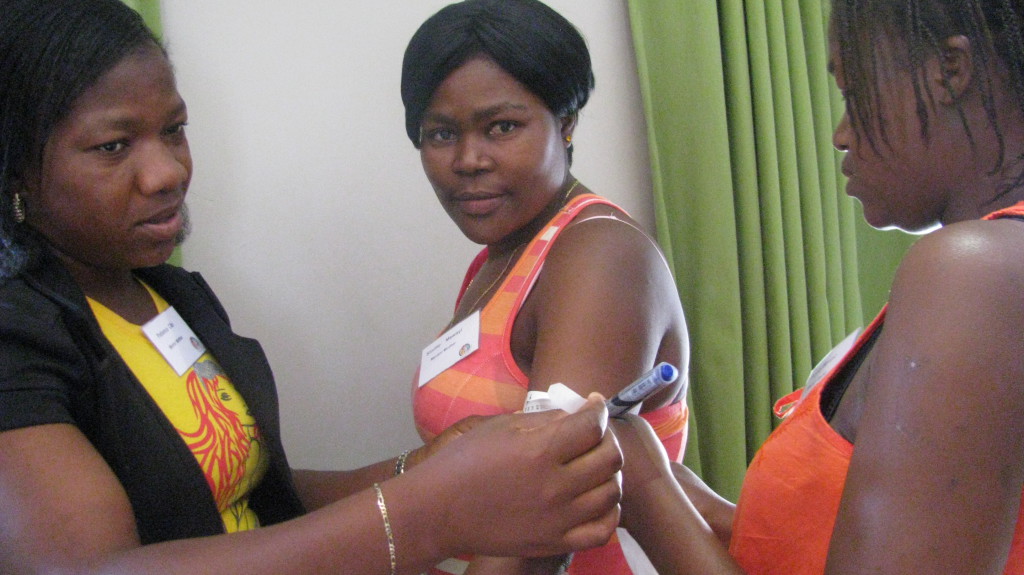Mentor Mothers' Exciting New Role

Mentor Mothers learning how to pre-screen clients and infants for malnutrition using mid-upper arm circumference (MUAC) testing
“When a woman comes to one of m2m’s sites, Mentor Mothers will now be able to look at them with bigger eyes and help them address many of their healthcare needs.” — Pindiso Ziki, Training and Education Manager for m2m South Africa who helped lead the workshop.
The workshop kicked off a three-month pilot of m2m’s new Enhanced Programme Model (EPM) that expands the services Mentor Mothers provide to areas of Reproductive, Maternal, Newborn, and Child Health (RMNCH). It is designed to enable m2m to better respond to the needs of HIV-positive and HIV-negative women and their families. While Mentor Mothers will still primarily be focused on preventing the transmission of HIV from mother to child and promoting maternal and infant health, they will also be equipped with the technical knowledge and skills to offer education, support, and referrals on a wide range of health issues important to their clients and their families and critical to improving overall health. m2m is also moving from solely providing Mentor Mother services in health facilities to reaching out into communities and villages in order to encourage women to access treatment early and stay in care through pregnancy, birth, and their children’s early years.
The Enhanced Programme Model responds to recommendations in the United Nations Global Plan to better integrate HIV interventions with RMNCH to ensure sustainability of service delivery and improvement in the survival of mothers and children.
“Mentor Mothers are well positioned to provide these enhanced services and increase their responsibilities as frontline healthcare workers. Clients tend to feel more comfortable talking with Mentor Mothers than doctors and nurses since Mentor Mothers are their peers and are from similar backgrounds,” said Eleanor McNab, Programme Support Manager at m2m who oversaw the pilot.
“Under the Enhanced Programme Model, Mentor Mothers’ interactions with HIV-negative women will be formalised, and they will have the technical knowledge and tools to provide education and referrals on a wider range of health issues,” she added.
The new programme was piloted earlier this year at 11 m2m sites in the Mpumalanga province of South Africa.
“EPM has boosted my confidence in giving health talks and conducting support groups. Using referral slips has also given me more confidence as we look like professionals. We are able to liaise with other units (in the health centre) and we are getting more respect and acknowledgement from clients,” said a Mentor Mother at one of the sites offering the enhanced services.
Health facility staff at the centres where the new programme was piloted were overwhelmingly receptive to it, reporting an increase in clients being referred for cervical cancer screening and nutrition services as a result of the education they received from Mentor Mothers. One health centre said that the community had started their own gardens to grow healthier food.
“Clients are becoming more and more open and asking questions related to their conditions,” said one nurse. Another nurse observed, “Clients have knowledge and they know how to… protect themselves.”
m2m is in the process of integrating the enhanced programme at all of its sites, adapting services for each context in which it works. Mentor Mothers and Site Coordinators who have already implemented the programme at the Mpumalanga sites will share their experiences with management staff in other countries through training workshops. m2m will continue to enhance its programme, and in the near future site staff will be trained to raise awareness and provide education to clients on neonatal male circumcision, as well as provide education, support, and referrals to clients who may be at risk of, or experiencing, gender-based violence.






















